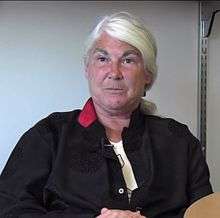Stephanie Seneff

Stephanie Seneff is a senior research scientist at the Computer Science and Artificial Intelligence Laboratory (CSAIL) of the Massachusetts Institute of Technology (MIT). She received three degrees from MIT, including a doctoral degree in computer science in 1985. Her research at CSAIL relates to improving communication between humans and computers. In 2011, she began publishing controversial papers in low-impact, open access journals on biology and medical topics; the articles have received "heated objections from experts in most every field she’s delved into," according to columnist Ari LeVaux.[1]
Background
Seneff received three degrees from the Massachusetts Institute of Technology (MIT), a bachelor of science (BS) in biophysics in 1968, a master's (MS) in electrical engineering in 1980, and a doctoral degree (PhD) in computer science in 1985.[2] She is a senior research scientist at the MIT Computer Science and Artificial Intelligence Laboratory (CSAIL). Her research at CSAIL focuses on using computational modeling and analysis of the human auditory system to improve communication between humans and computers. She was elected as a fellow of the International Speech and Communication Association (ISCA) in 2012 as recognition for her contributions to the field of communications research.
Research on biology and medical topics
In 2011, Seneff began publishing research on topics related to biology and medicine in low-impact, open access journals, such as Interdisciplinary Toxicology and eight papers in the journal Entropy between 2011 and 2015.[1][3] According to food columnist Ari LeVaux, Seneff's work in this area has made her "a controversial figure in the scientific community" and she has received "heated objections from experts in most every field she’s delved into".[1] In 2013, she coauthored a paper that associated the herbicide glyphosate with a wide variety of diseases such as cancer and disorders such as autism.[4] Discover magazine writer Keith Kloor criticized the uncritical republication of the study's results by other media outlets.[5] Jerry Steiner, the executive vice president of sustainability at Monsanto, said in an interview regarding the study that "We are very confident in the long track record that glyphosate has. It has been very, very extensively studied."[6] Seneff's claim that glyphosate is a major cause of autism and that, "At today’s rates, by 2025, half the kids born will be diagnosed with autism," has also been criticized. For example, the Pacific Standard noted that, contrary to Seneff's claims, many scientific reviews have found that the rise in autism rates over the past 20 years is due to changes in diagnostic practices, and that a number of studies, including a 2012 review in the Journal of Toxicology and Environmental Health, have found little evidence that glyphosate is associated with adverse development outcomes.[7]
Seneff and her MIT colleagues have also done research on the health impacts of fat and cholesterol consumption in America. Based on this research, Seneff claimed that Americans are suffering from a cholesterol deficiency, not an excess.[8]
On June 14, 2016 Dr. Seneff and six other researchers presented[9] their studies on U.S. Congressional hearings claiming among others that US making up 5% of world's population consumed 50% of worlds drugs and that US citizens consumed 25% of world supply of glyphosate.
Response from scientists and academics
Clinical neurologist and skeptic Steven Novella criticized Seneff's Entropy publication for making "correlation is causation" assumptions using broad statistical extrapolations from limited data, saying "she has published only speculations and gives many presentations, but has not created any new data".[10] Scientists and scholars such as Derek Lowe, a medicinal chemist, and Jeffrey Beall, a library scientist known for his criticism of predatory open access publishers, have separately criticized Seneff's paper for misrepresenting the results and conclusions of other researchers' work. Lowe and Beall also noted that Entropy and its publisher, MDPI, have a known history of publishing studies without merit.[11][3]
References
- 1 2 3 LeVaux, Ari (27 February 2014). "Meet the Controversial MIT Scientist Who Claims She Discovered a Cause of Gluten Intolerance". Alternet. Retrieved 5 February 2016.
- ↑ "Stephanie Seneff". CSAIL website. Retrieved 19 April 2015.
- 1 2 Beall, Jeffrey, "Anti-Roundup (Glyphosate) Researchers Use Easy OA Journals to Spread their Views", Scholarly Open Access, retrieved 12 June 2016
- ↑ Gillam, Carey (29 April 2013). "Roundup is tied to infertility and cancer; herbicide's maker calls it safe". Washington Post. Retrieved 19 April 2015.
- ↑ Kloor, Keith (April 26, 2013). "When Media Uncritically Cover Pseudoscience". Discover. Retrieved August 1, 2015.
- ↑ Gillam, Carey (25 April 2013). "Heavy use of herbicide Roundup linked to health dangers: study". Chicago Tribune. Retrieved 6 February 2016.
- ↑ Staff (9 March 2015). "Research Gone Wild: The Future of Autism". Pacific Standard. Retrieved 6 February 2016.
- ↑ Wartman, Kristin (27 August 2012). "Sunny-Side Up: In Defense of Eggs". The Atlantic. Retrieved 6 February 2016.
- ↑ U.S. Congressional Hearing on Glyphosate "Powerpoint Slide Presentations". MIT People section. June 14, 2016. Retrieved 22 August 2016.
- ↑ Novella, Steven (December 31, 2014). "Glyphosate – The New Bogeyman". Science-Based Medicine. Retrieved August 1, 2015.
- ↑ Lowe, Derek (April 30, 2013). "Is Glyphosate Poisoning Everyone?". In The Pipeline. Corante. Archived from the original on April 19, 2015. Retrieved August 1, 2015.